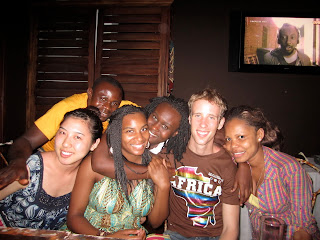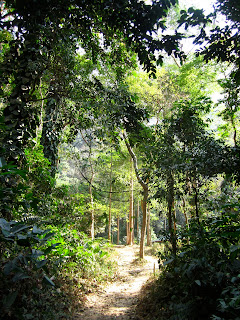Since I walked out of the Kotoka International Airport at Accra almost one month ago on January 6, I have definitely felt Welcomed. "You are welcome," is a common phrase that you say to someone here in English. It is a translation from Twi, an Akan language widely spoken in Accra and around Ghana. "Akwaaba," therefore literally means that you are welcome to this place.
Cedis and Pesewas
Ghana is a very unique place. For the first week I was here, I felt more like I was in Africa than Ghana. More specifically, I really felt like I was in sub-Saharan Africa. That may sound strange and might not make sense, but it's how I felt. I was seeing things that reminded me of the Africa that was always presented to me in popular media and public representations (and mis representations for that matter). Hectic traffic, bustling underdeveloped city centers, black Africans, poor African children jumping in front of my camera lens, shantytown and slums filled with poor young kids and adolescents playing soccer, small villages with mud thatched huts and nude villagers, slight signs of modernity next to old and outdated colonial architecture, hints of a rising and developing economy in city centers, bribing of police officers. . . These were my first impressions. I could have been anywhere in sub-Saharan Africa for all I knew. I was unaware of what Ghana is and where the divide between African and particularly Ghanaian lies.
Adinkra Stamping Village - Important Ghanaian symbols imprinted on kente cloth.
Kumasi Traffic
palm nuts! Used for palm oil, a MUST in Ghanaian food
I traded this girl my pen for a photo. Interesting. . .
The typical reaction from kids
Kakum Canopy Walk, Ashanti Region

Then it all started becoming Ghana to me. After arriving, I went to a small hostel on the beach in Accra. I was dropped off in what looked like a small slum neighborhood in Accra, only to find out that the hostel was a part of that neighborhood. After a very sweaty and dusty first night, I awoke early to jump aboard a 5 hour bus (that was 2 hours late) and two hour taxi across the southern coast of Ghana to the Western Region in search for a beautiful isolated beach near the village of Akwiida. I spent four days on an isolated beach that stretched miles in both directions to the plush green Ghanaian jungle. It was a nice way to dive into a new place and get over the cold Ohio winter I just came from (It was around 12 degrees when I left Cleveland, and about 95 degrees I got to Ghana). The most intriguing thing was how different the culture was here in Western Ghana then back east in Accra where I would be studying the rest of the semester. For example, most people speak Fante and a few other languages that are not spoken in Accra. It was a preview into the complexity of Ghana.

Coming back to Accra about a week after arriving in Ghana, I joined up with 26 other Americans from the University of California and so began my study abroad in Ghana. It was interesting to see the reactions and first impressions for students who just got off of the plane after being here for a week. I had already traveled across Ghana, learned a few Twi phrases, shopped around the markets, figured out transportation and even had my first "tro-tro" experience. I was skeptical about doing another study abroad since I mostly just wanted to come to Ghana to do my own thing and pursue some possibilities of projects and research. But, right away the program seemed pretty legit. We had a two week long orientation that included hanging out with Ghanaian students, learning about and eating awesome Ghanaian food, touring the campus, visiting slave forts in Central Region, traditional African dance lesson, learning about the role of traditional chiefs and Asante culture in Ghana, going out in the big cities of Accra and Kumasi, a canopy walk through the rainforest, feeding monkeys, learning Twi, swimming under waterfalls in the Volta Region, learning about Ghanaian society through a roundtable conference, cooking lessons, managing and bargaining at the markets and going to the beach! I felt like I got my money's worth so far. My room is a little shanty, but it will be really interesting to live in a hall with all other Ghanaian students!


Right now I am still trying to get established and figure out my place in Ghana. I am trying to get a project started with photography with youth in a local shantytown, but things are moving slow. I am also trying to navigate my way through classes and registering at the University of Ghana. I am super intrigued by certain uniquely Ghanaian themes though, like Christianity in Ghana, the role of chiefs and practices of chieftaincy throughout Ghana, the layers of identity in Ghana -from national to regional to tribal, the impressive reduction in poverty over the past two decades, sanitation issues in urban areas, environmental and wildlife degradation in Ghana, the role of dancing and celebration in social affairs, and so much more! Right now though, all I really want to do is learn fluent Twi, become a professional African dancer and figure out the food culture of Ghana (including how to cook it all!)!!
my new dance teachers


















1 comment:
Ryan, I am amazed at the detail you are able to include in a travelouge! Keep up the good work!
Post a Comment